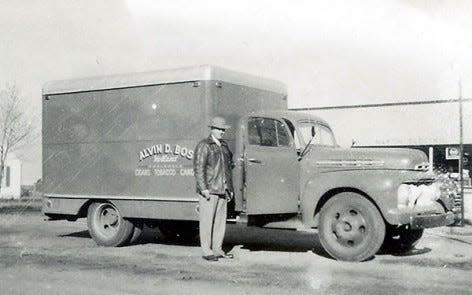Steve VanderVeen: How the Bos family got involved in vending machines

Businesses stay alive by adapting. That's especially true for the VanTongeren and Bos family businesses.
Hermanus (Herman) Van Tongeren was born in 1866 in Overijssel in the Netherlands. In 1893, Herman married Susie Romeyn in Zeeland, Michigan. Their daughter, Janet, was born in 1894. Their son, Chester, was born in 1896.
Meanwhile, in the mid-1800s, the Bos family immigrated to the Holland area and homesteaded a farm on Riley Street. Before the advent of the automobile, they delivered kegs of beer by horse and wagon to various locations in West Michigan.
In 1921, William Bos married Janet Van Tongeren and joined his father-in-law’s business. Herman, by that time, had a cigar factory, wholesale business and retail store at 12 E. Eighth St.
At that time, cigars were kept fresh in humidors: small wooden boxes with glass fronts and a heating element on the bottom, which warmed a pan of water to create humidity and kept the cigars from drying out. In the late 1920s, cigars began to be wrapped in cellophane, giving them a longer shelf life.
The invention of cellophane also gave candy a longer shelf life. Encouraged by those trends, William started his own company, Bos Tobacco and Candy, operating out of the basement of his father-in-law’s business and delivering his cigars and candy to small retailers in a panel truck.
During the Prohibition, William added soda pop to his product line — as beer brewers switched to making “near beer” and soft drinks. One of his brands was Blatz flavored drinks.
In 1926, Herman’s son, Chester, bought a souvenir business from a man named DeWeerdt, who sold wooden shoes to the Kresge and Woolworth stores in Holland. That business eventually became the Holland Bowl Mill.
William's brother, Alvin, became involved in Bos Tobacco and Candy, which served territories outside of Holland, including Grand Haven and Allegan. The business survived the Great Depression because people kept spending money on small pleasures like tobacco and candy.
After the Prohibition was repealed, in 1933, Bos Tobacco and Candy added beer to their product line. But the family wasn’t comfortable with the way brewers wanted their distributors to sell beer — offering free samples in bars. So, in 1939, the brothers ended their relationship with them.
In 1940, Alvin D. Bos formed the A.D. Bos Company. During World War II, the government rationed sugar and tobacco. In 1947, William sold his business to Melvin Acherhof, who sold it to Alvin. Meanwhile, another brother, Gerald, built a similar business in Grand Rapids.
In the 1950s, A.D. Bos Co. sold to gas stations, which — at the time — were "full service." That meant the attendant spent time outside the building serving customers, leaving the inside unoccupied. As a result, theft became a problem. The vending machine solved this problem.
In response, Alvin invested in vending machines that sold cigarettes. Then, in the 1960s, he invested in vending machines that sold coffee.

A.D. Bos grew rapidly. Meanwhile, supermarkets were becoming more popular, replacing small grocery stores. Alvin decided to sell off the wholesale portion of his business and focus solely on setting up and servicing vending machines. He also started setting up vending machines in factories.
His first Holland-area industrial account was Holland Color on Ottawa Beach Road. In 1962, he placed vending machines in Holland High School’s new facility, which — at the time — didn't have a cafeteria.
In 1966, his son — Thomas (Tom) G. Bos — left his teaching position at West Ottawa Public Schools to join his father's business. Tom became president of A.D. Bos in 1972.
In the 1970s, Tom invested in the Bunn coffee system and installed them in business offices. In 1980, A.D. Bos Co. moved into the Holland Motor Express at 1 W. Fifth St. — originally a canning factory and later an office building for DePree Chemical.
Subscribe:Get all your breaking news and unlimited access to our local coverage
In 1997, Thomas' son — Tom J. Bos — joined the business as president.
In 2005, Tom J. moved the company to 308 Garden St. He later began investing in self-checkout markets.
Information for this story comes from Robert Swierenga’s "Holland, Michigan," an interview with Thomas G. Bos and a presentation by Thomas G. and Thomas J. Bos at Hope College in 2019.
— Community Columnist Steve VanderVeen is a resident of Holland. Contact him through start-upacademeinc.com.
This article originally appeared on The Holland Sentinel: Holland History: How the Bos family got involved in vending machines

